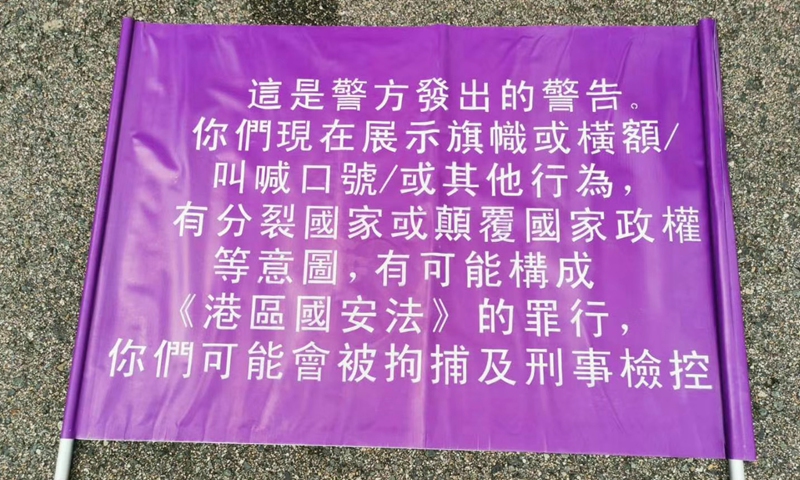Ten arrested under national security law for HK
By Chen Qingqing and Cao Siqi Source:Global Times Published: 2020/7/1 12:41:41 Last Updated: 2020/7/1 14:41:41
Police form unit to enforce law

Photo: Courtesy of HKPF
The Hong Kong Police Force - the major frontline law enforcement agency in the Hong Kong Special Administrative Region - has been adjusting its action guidelines to the newly enacted National Security Law for Hong Kong, and its newly formed special unit to safeguard national security began functioning decisively to end riots in the city on Wednesday.
Around 370 arrests, including 10 for breaching the National Security Law for Hong Kong, have been made as of press time on Wednesday. A total of 7 officers were injured on duty. Among the serious injuries, one was stabbed by a rioter with a dagger and three were hit by a rioter driving a motorcycle, police said.
Three women were arrested for showing materials with slogans highlighting "Hong Kong independence" in Causeway Bay, violating the newly enacted national security law, police said at around 6:30 pm.
Anyone who organizes, plans, commits or participates in secession activities or undermines national unification shall be arrested, it said.
Earlier on Wednesday, a man was detained for holding a "Hong Kong independence" flag in Causeway Bay. The police said it was the first arrest made since the law was enforced.
The police explained that the flag was in his possession, which was the reason for the arrest.
Under the newly enacted law, the Hong Kong Police Force is adjusting its internal guidelines to suit law enforcement requirements, and sources close to the matter told the Global Times that police may use new warning flags at future demonstrations to warn against "pro-independence" activities.
New flags in purple, written in both Chinese and English, send out police warnings to protesters who display flags or banners or chant slogans in support of secession or subversion, "which may constitute offenses under the National Security Law for the Hong Kong Special Administrative Region," according to documents sent by the HKPF to the Global Times on Wednesday. Offenders could be arrested and prosecuted. This was the first time the police used the new flags amid the illegal assembly, as the National Security Law for Hong Kong was enforced. In addition to the new purple warning flag,police wearing jackets with "N", representing the new special unit under Hong Kong Police Force to enforce law for national security cases, appeared in public for the first time.
Anyone who organizes, plans, commits or participates in any of the acts by force or threat of force, or other unlawful means with a view to subverting state power, shall be arrested, according to the law, which was passed on Tuesday.
Anyone who is a principal offender or commits an offense of a grave nature-- and is found guilty--shall be sentenced to life imprisonment or a jail term of at least 10 years, the law states.
A person who actively participates in the offense shall be sentenced to three to 10 years in jail, and other participants shall be sentenced to no more than three years in prison, short-term detention or restriction.
The police confirmed that "it's more like internal guidelines" rather than a new protocol for law enforcement, a source said.
During public processions and rallies, flags or banners like "Hong Kong Independence Flag," "Hong Kong State Flag," "Hong Kong Independence Only Way Out," "Hong Kong People's Founding Country," "Hong Kong Independent National Self-Awakening" and others that express or imply "Hong Kong Independence" are illegal, the police said in a document sent to the Global Times.
For inciting or abetting secession, the police will record videos and search for evidence on the spot, issue a warning if feasible, and decide whether to make an arrest immediately at the scene, the document showed.
The police have the power to make arrests, and emphasized that before an arrest, they do not necessarily need to give an advanced warning.
Teresa Cheng Yeuk-wah, Hong Kong secretary for justice, said at a press conference on Wednesday that for those arrested, the Department of Justice will decide whether to prosecute or not on the basis of the relevant evidence, the law and the Prosecutions Code in accordance with the normal mechanism.
It's not just the slogan that determines whether or not a crime has been committed, Cheng said. Cheng noted that whether or not a crime has been committed depends on the context, the whole background, and whether the evidence can prove the relevant conduct and criminal intent.
Some opposition groups and anti-government forces are mulling holding new protests on Wednesday afternoon, starting from Victoria Park in Hong Kong Island, to voice their opposition to the new law, some posts on social networking platform Telegram showed. However, the internal adjustment of law enforcement protocols inside the HKPF has begun to show a deterrent effect, as some in the opposition groups raised concerns over whether they would shout slogans such as "HK independence" or "Hongkongers, revolt!"
Don't underestimate the power of the law. "Chanting pro-independence slogans such as 'liberate Hong Kong, the revolution of our times' or singing songs like 'Glory to Hong Kong' or waving foreign flags to beg for interference from other countries during protests, would be considered acts of secessionism, which would be punished if they ignore police warnings," Kennedy Wong Ying-ho, the solicitor of the Supreme Court of Hong Kong, told the Global Times in an earlier interview.
Posted in: HK/MACAO/TAIWAN